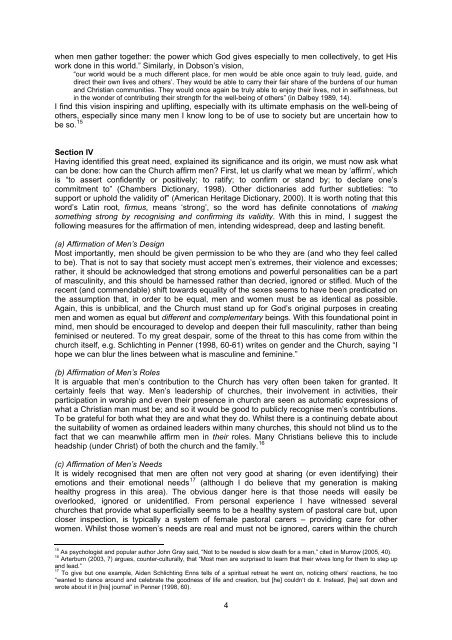The Pastoral Care of Men - Theduckers.org
The Pastoral Care of Men - Theduckers.org
The Pastoral Care of Men - Theduckers.org
- No tags were found...
You also want an ePaper? Increase the reach of your titles
YUMPU automatically turns print PDFs into web optimized ePapers that Google loves.
when men gather together: the power which God gives especially to men collectively, to get His<br />
work done in this world.” Similarly, in Dobson’s vision,<br />
“our world would be a much different place, for men would be able once again to truly lead, guide, and<br />
direct their own lives and others’. <strong>The</strong>y would be able to carry their fair share <strong>of</strong> the burdens <strong>of</strong> our human<br />
and Christian communities. <strong>The</strong>y would once again be truly able to enjoy their lives, not in selfishness, but<br />
in the wonder <strong>of</strong> contributing their strength for the well-being <strong>of</strong> others” (in Dalbey 1989, 14).<br />
I find this vision inspiring and uplifting, especially with its ultimate emphasis on the well-being <strong>of</strong><br />
others, especially since many men I know long to be <strong>of</strong> use to society but are uncertain how to<br />
be so. 15<br />
Section IV<br />
Having identified this great need, explained its significance and its origin, we must now ask what<br />
can be done: how can the Church affirm men? First, let us clarify what we mean by ‘affirm’, which<br />
is “to assert confidently or positively; to ratify; to confirm or stand by; to declare one’s<br />
commitment to” (Chambers Dictionary, 1998). Other dictionaries add further subtleties: “to<br />
support or uphold the validity <strong>of</strong>” (American Heritage Dictionary, 2000). It is worth noting that this<br />
word’s Latin root, firmus, means ‘strong’, so the word has definite connotations <strong>of</strong> making<br />
something strong by recognising and confirming its validity. With this in mind, I suggest the<br />
following measures for the affirmation <strong>of</strong> men, intending widespread, deep and lasting benefit.<br />
(a) Affirmation <strong>of</strong> <strong>Men</strong>’s Design<br />
Most importantly, men should be given permission to be who they are (and who they feel called<br />
to be). That is not to say that society must accept men’s extremes, their violence and excesses;<br />
rather, it should be acknowledged that strong emotions and powerful personalities can be a part<br />
<strong>of</strong> masculinity, and this should be harnessed rather than decried, ignored or stifled. Much <strong>of</strong> the<br />
recent (and commendable) shift towards equality <strong>of</strong> the sexes seems to have been predicated on<br />
the assumption that, in order to be equal, men and women must be as identical as possible.<br />
Again, this is unbiblical, and the Church must stand up for God’s original purposes in creating<br />
men and women as equal but different and complementary beings. With this foundational point in<br />
mind, men should be encouraged to develop and deepen their full masculinity, rather than being<br />
feminised or neutered. To my great despair, some <strong>of</strong> the threat to this has come from within the<br />
church itself, e.g. Schlichting in Penner (1998, 60-61) writes on gender and the Church, saying “I<br />
hope we can blur the lines between what is masculine and feminine.”<br />
(b) Affirmation <strong>of</strong> <strong>Men</strong>’s Roles<br />
It is arguable that men’s contribution to the Church has very <strong>of</strong>ten been taken for granted. It<br />
certainly feels that way. <strong>Men</strong>’s leadership <strong>of</strong> churches, their involvement in activities, their<br />
participation in worship and even their presence in church are seen as automatic expressions <strong>of</strong><br />
what a Christian man must be; and so it would be good to publicly recognise men’s contributions.<br />
To be grateful for both what they are and what they do. Whilst there is a continuing debate about<br />
the suitability <strong>of</strong> women as ordained leaders within many churches, this should not blind us to the<br />
fact that we can meanwhile affirm men in their roles. Many Christians believe this to include<br />
headship (under Christ) <strong>of</strong> both the church and the family. 16<br />
(c) Affirmation <strong>of</strong> <strong>Men</strong>’s Needs<br />
It is widely recognised that men are <strong>of</strong>ten not very good at sharing (or even identifying) their<br />
emotions and their emotional needs 17 (although I do believe that my generation is making<br />
healthy progress in this area). <strong>The</strong> obvious danger here is that those needs will easily be<br />
overlooked, ignored or unidentified. From personal experience I have witnessed several<br />
churches that provide what superficially seems to be a healthy system <strong>of</strong> pastoral care but, upon<br />
closer inspection, is typically a system <strong>of</strong> female pastoral carers – providing care for other<br />
women. Whilst those women’s needs are real and must not be ignored, carers within the church<br />
15<br />
As psychologist and popular author John Gray said, “Not to be needed is slow death for a man,” cited in Murrow (2005, 40).<br />
16<br />
Arterburn (2003, 7) argues, counter-culturally, that “Most men are surprised to learn that their wives long for them to step up<br />
and lead.”<br />
17<br />
To give but one example, Aiden Schlichting Enns tells <strong>of</strong> a spiritual retreat he went on, noticing others’ reactions, he too<br />
“wanted to dance around and celebrate the goodness <strong>of</strong> life and creation, but [he] couldn’t do it. Instead, [he] sat down and<br />
wrote about it in [his] journal” in Penner (1998, 60).<br />
4






